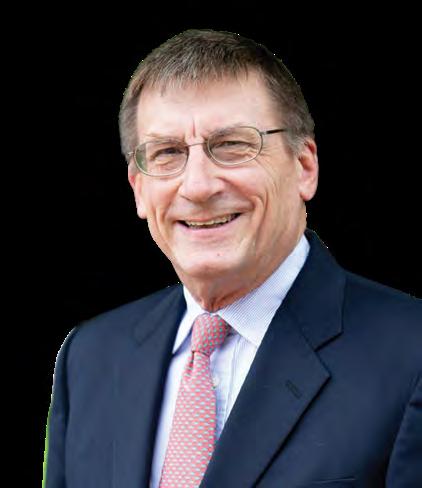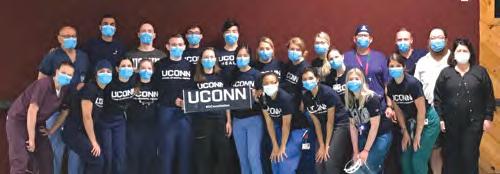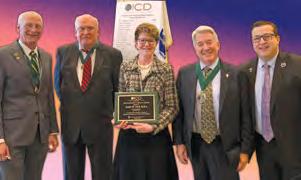
4 minute read
Editorial
E D I T O R I A L
EDITOR’S NOTE
by Richard F. Roadcap
THE DAY THE MUSIC DIED
illiam James (1842-1910), considered to
Wbe the father of American psychology, said “I don’t sing because I am happy. I am happy because I sing.” Not only was James a philosopher and psychologist, he also attended Harvard Medical School. Although he did not practice medicine, I’m sure he had a grasp of the healing arts and their impact on the patient and the practitioner. English novelist George Eliot, whose real name was Mary Anne Evans, said in 1860 “Life seems to go on without effort when I am filled with music.”1
Music has proven to be a source of inspiration and communication for thousands of years. We’d all be poor in spirit if we were embargoed from listening to music. And so it is with service to others: our productivity and sense of well-being is enhanced, when we see a need that is not being met and we seek to meet that need, even if it requires us to step outside our comfort zone. The previous twenty-four months have seen many service opportunities removed from our calendars, often never to be replaced, or perhaps rescheduled for another time.
Although there may never be a “new normal”, a new reality has emerged. The era of large, multi-day, convention center service projects may be over. A new paradigm for dental outreach may be in the works. Many states, including my home state of Virginia, now offer adult dental benefits to Medicaid recipients, with a corresponding decline in emergency department visits for dental treatment.2 One would deduce that fewer patients now lack access to care if their needs can be serviced by a local participating dentist. Missions of Mercy projects have relied, in large measure, on providing care to patients who have no third-party benefits, such as adult Medicaid recipients and the working uninsured. Combined with the fear of spreading the SARS-CoV-2 virus, the shrinkage of this patient population may lead us to rethink volunteer missions.
But no one, including me, believes there will a shortfall of volunteer opportunities. Perhaps future events will be focused on providing specific procedures to a well-defined patient population, in a controlled environment. An example of this approach was highlighted in the 2021 KEY3, where over 100 patients received oral surgery treatment over the course of two days in 2020. After screening and triage, patients were admitted by one door and discharged by another, never to encounter one another in a waiting room. Each one of us has been confronted by a patient who admits they “never wear the lower denture”, even if it was created in our office with exquisite border molded impressions and jaw relation records. What if these patients went from being a dental cripple to functioning occlusion with the placement of two implants in the lower arch? Most third-party plans will not reimburse for implants regardless of circumstances.
As with music, volunteering can be a form of selfexpression and fulfillment that serves to make us whole. For many, these benefits have been withheld from us during the last two years. As I write I’m looking forward to participating in a project, held annually in most circumstances, that last took place in 2019. It will be three years since the previous event, as the 2020 and 2021 events were cancelled. For reasons I don’t understand, the event carries with it a vibe that draws volunteers back every year. Trust me it’s not the venue (a college gym) or the food (donated by Hardee’s) that brings me back. I guess it’s the energy created by the patients and the many volunteers.
No, the music hasn’t died, only the tune has changed. February 3, 1959 and March 17, 2020 were just dates on a calendar. A future Nobel laureate asked in 1965, “How does it feel?”4 How does it feel to forego something that confirms our identity as a professional and member of our community? For most ICD Fellows volunteering and service is the music that makes life go on, seemingly without effort. A patient the other day asked me what part of dental practice was the same as the day I graduated, and I said “nothing”. And so it is with volunteering: we’ll learn a new song.
REFERENCES
1 - Eliot, George. The Mill on the Floss. New York; Harper & Brothers. 1860 2 - Elani HW, Kawachi I, Sommers BD. Changes in emergency department dental visits after Medicaid expansion. Health Serv Research. 2020; 55(3): 367-374 3 - Alouf SB, Miller SR. Access to Care – A Novel Approach. KEY. 2021; 20-22 4 - https://www.youtube.com/watch?v=a6Kv0vF41Bc

IC D U S A Congratula ons Class of 2021!
SECTION D I STRICT 1
UConn School of Dental Medicine launched its first post-Covid outreach program in Houlton and Ellsworth, Maine. ICD contributed PPE to the clinic. Fellows Tim Oh, David Fried and newest Fellow Ronald Albert mentored students who provided restorative, endodontic and surgical care to patients in need of services.

Eighteen D-1 Class of 2020 and 2021 Fellows were pleased to meet one another in person during the January 2022 Distinguished Service Award luncheon. D-1 Fellows (L-R) Regent Eliot Paisner, Imm. Past Regent Francis Connor, Jr., Distinguished Service Award recipient Judith Fisch, ICD Secretary General Joseph Kenneally, and ADA First District Trustee Richard Rosato were among the 80 Fellows who attended our annual Distinguished Service Award Luncheon on 1/28/22. D-1 Regent Eliot Paisner hosted ICD USA Section President Risé Martin for the 2022 Distinguished Service Award luncheon.



